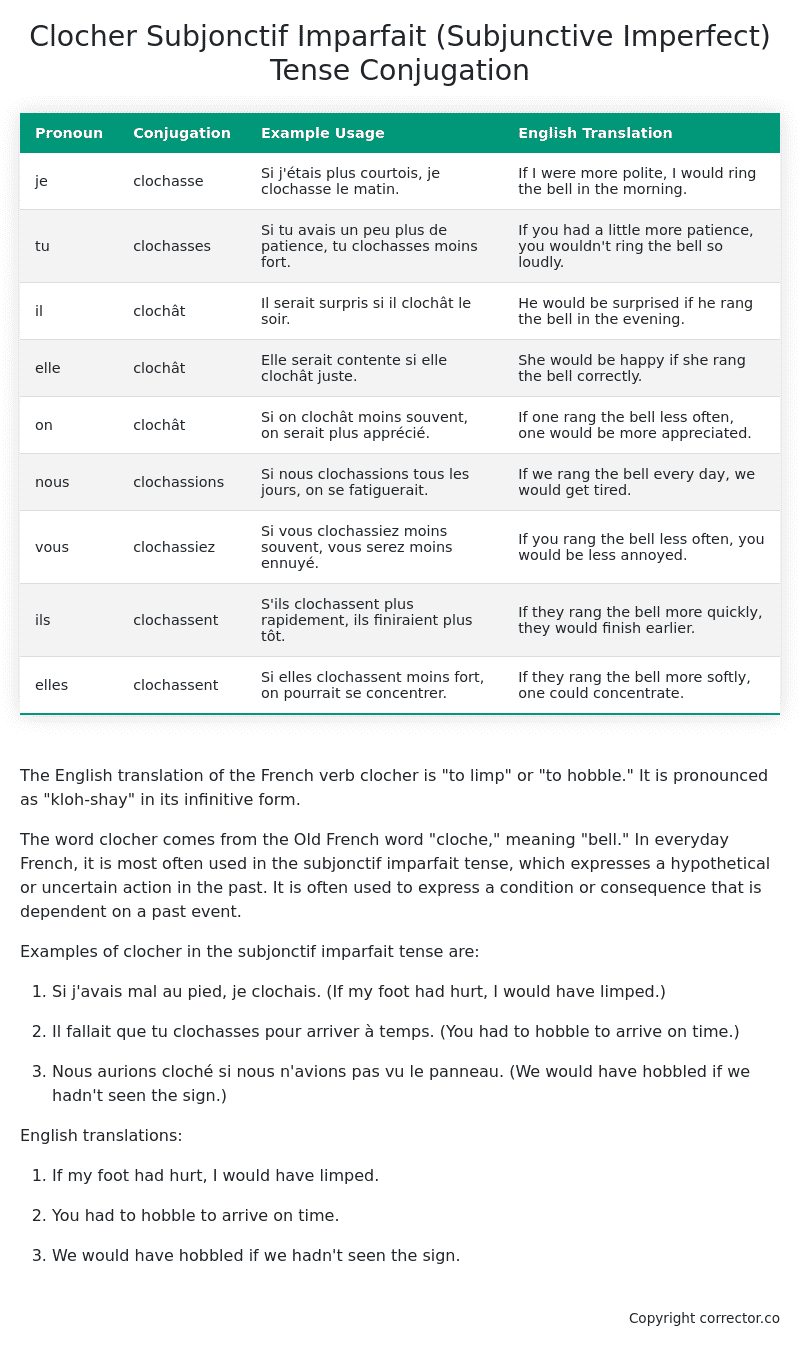Subjonctif Imparfait (Subjunctive Imperfect) Tense Conjugation of the French Verb clocher
Introduction to the verb clocher
The English translation of the French verb clocher is “to limp” or “to hobble.” It is pronounced as “kloh-shay” in its infinitive form.
The word clocher comes from the Old French word “cloche,” meaning “bell.” In everyday French, it is most often used in the subjonctif imparfait tense, which expresses a hypothetical or uncertain action in the past. It is often used to express a condition or consequence that is dependent on a past event.
Examples of clocher in the subjonctif imparfait tense are:
-
Si j’avais mal au pied, je clochais. (If my foot had hurt, I would have limped.)
-
Il fallait que tu clochasses pour arriver à temps. (You had to hobble to arrive on time.)
-
Nous aurions cloché si nous n’avions pas vu le panneau. (We would have hobbled if we hadn’t seen the sign.)
English translations:
-
If my foot had hurt, I would have limped.
-
You had to hobble to arrive on time.
-
We would have hobbled if we hadn’t seen the sign.
Table of the Subjonctif Imparfait (Subjunctive Imperfect) Tense Conjugation of clocher
| Pronoun | Conjugation | Example Usage | English Translation |
|---|---|---|---|
| je | clochasse | Si j’étais plus courtois, je clochasse le matin. | If I were more polite, I would ring the bell in the morning. |
| tu | clochasses | Si tu avais un peu plus de patience, tu clochasses moins fort. | If you had a little more patience, you wouldn’t ring the bell so loudly. |
| il | clochât | Il serait surpris si il clochât le soir. | He would be surprised if he rang the bell in the evening. |
| elle | clochât | Elle serait contente si elle clochât juste. | She would be happy if she rang the bell correctly. |
| on | clochât | Si on clochât moins souvent, on serait plus apprécié. | If one rang the bell less often, one would be more appreciated. |
| nous | clochassions | Si nous clochassions tous les jours, on se fatiguerait. | If we rang the bell every day, we would get tired. |
| vous | clochassiez | Si vous clochassiez moins souvent, vous serez moins ennuyé. | If you rang the bell less often, you would be less annoyed. |
| ils | clochassent | S’ils clochassent plus rapidement, ils finiraient plus tôt. | If they rang the bell more quickly, they would finish earlier. |
| elles | clochassent | Si elles clochassent moins fort, on pourrait se concentrer. | If they rang the bell more softly, one could concentrate. |
Other Conjugations for Clocher.
Le Present (Present Tense) Conjugation of the French Verb clocher
Imparfait (Imperfect) Tense Conjugation of the French Verb clocher
Passé Simple (Simple Past) Tense Conjugation of the French Verb clocher
Passé Composé (Present Perfect) Tense Conjugation of the French Verb clocher
Futur Simple (Simple Future) Tense Conjugation of the French Verb clocher
Futur Proche (Near Future) Tense Conjugation of the French Verb clocher
Plus-que-parfait (Pluperfect) Tense Conjugation of the French Verb clocher
Passé Antérieur (Past Anterior) Tense Conjugation of the French Verb clocher
Futur Antérieur (Future Anterior) Tense Conjugation of the French Verb clocher
Subjonctif Présent (Subjunctive Present) Tense Conjugation of the French Verb clocher
Subjonctif Passé (Subjunctive Past) Tense Conjugation of the French Verb clocher
Subjonctif Imparfait (Subjunctive Imperfect) Tense Conjugation of the French Verb clocher (this article)
Subjonctif Plus-que-parfait (Subjunctive Pluperfect) Tense Conjugation of the French Verb clocher
Conditionnel Présent (Conditional Present) Tense Conjugation of the French Verb clocher
Conditionnel Passé (Conditional Past) Tense Conjugation of the French Verb clocher
L’impératif Présent (Imperative Present) Tense Conjugation of the French Verb clocher
L’infinitif Présent (Infinitive Present) Tense Conjugation of the French Verb clocher
Struggling with French verbs or the language in general? Why not use our free French Grammar Checker – no registration required!
Get a FREE Download Study Sheet of this Conjugation 🔥
Simply right click the image below, click “save image” and get your free reference for the clocher Subjonctif Imparfait tense conjugation!

Clocher – About the French Subjonctif Imparfait (Subjunctive Imperfect) Tense
Formation
Common Everyday Usage Patterns
Interactions with Other Tenses
Subjonctif Présent
Indicatif Passé Composé
Conditional
Conditional Perfect
Summary
I hope you enjoyed this article on the verb clocher. Still in a learning mood? Check out another TOTALLY random French verb conjugation!


